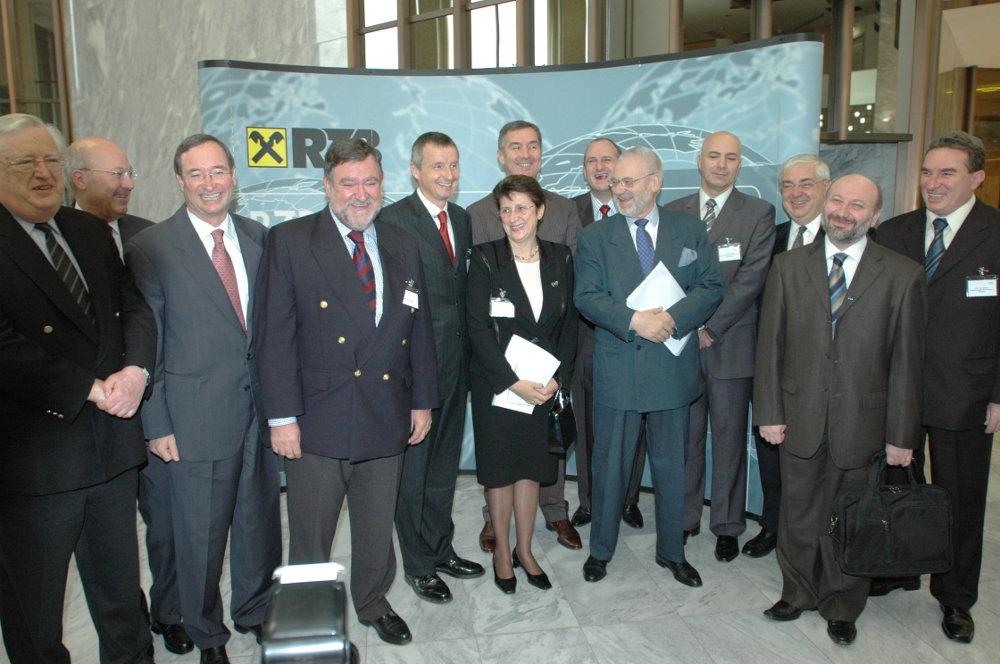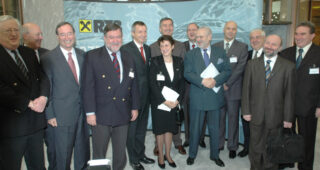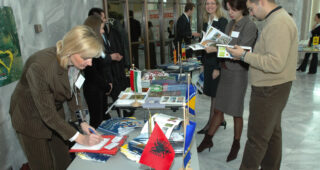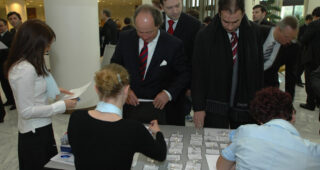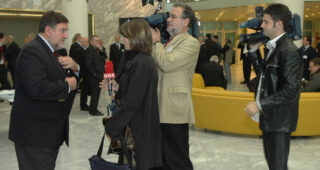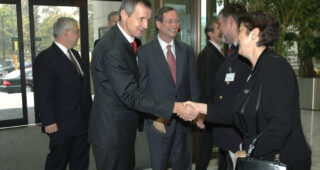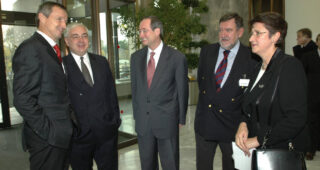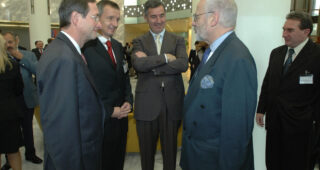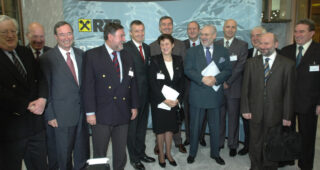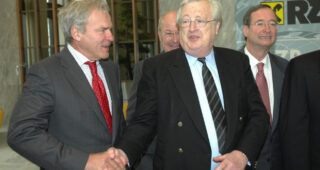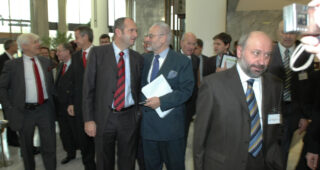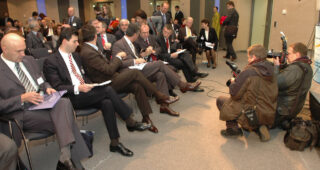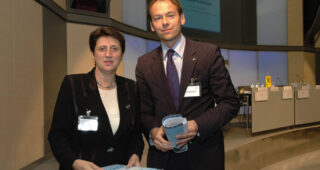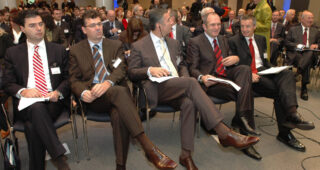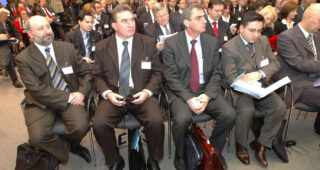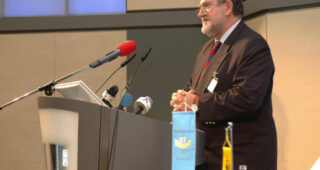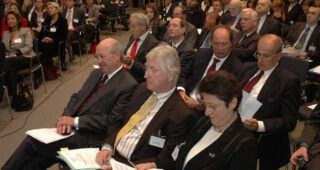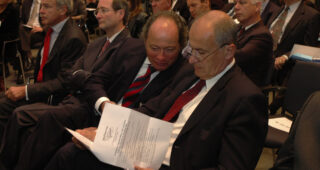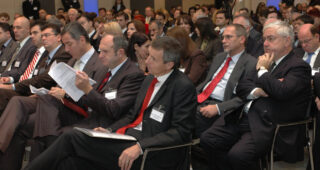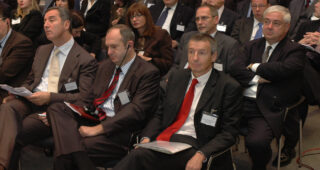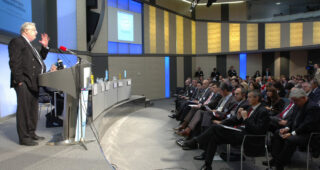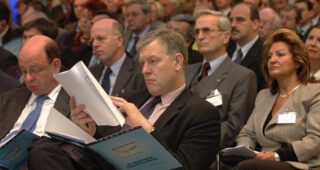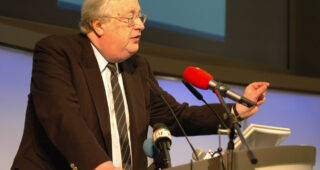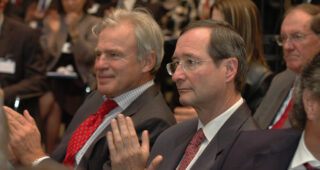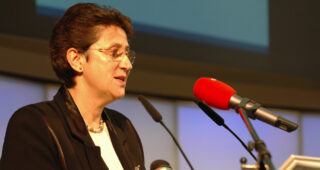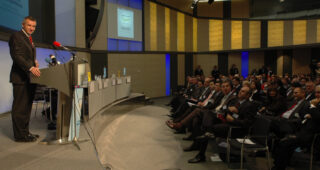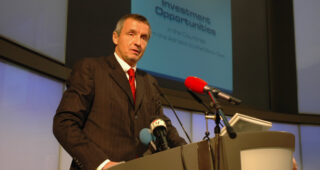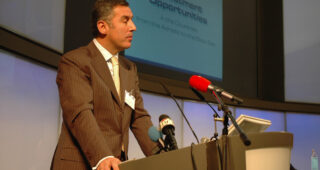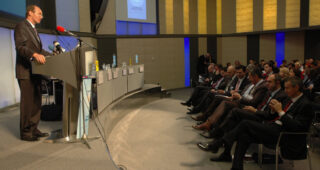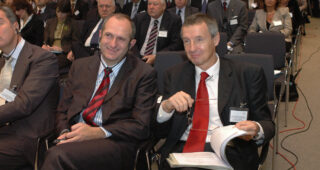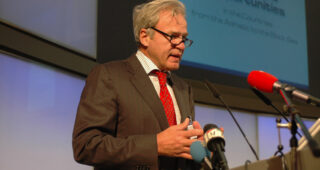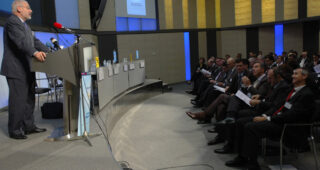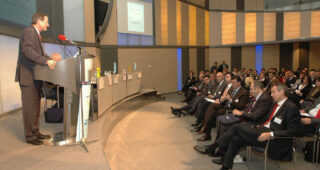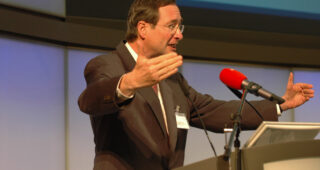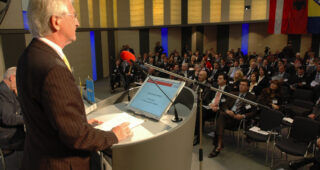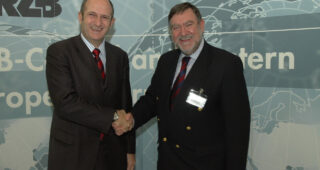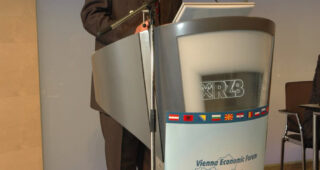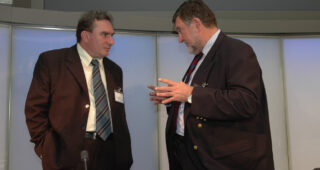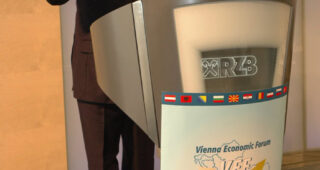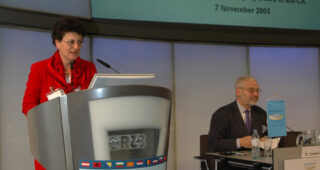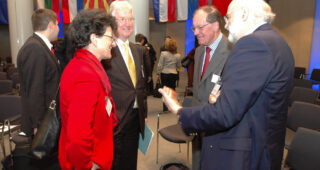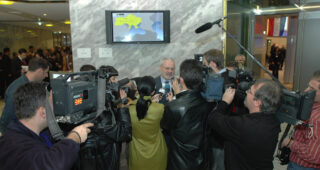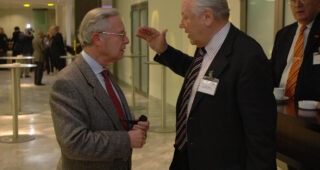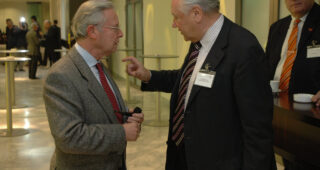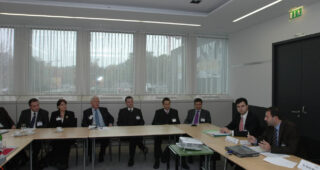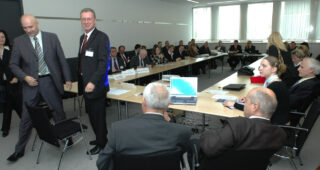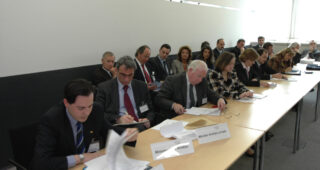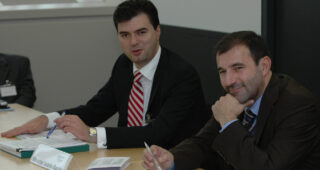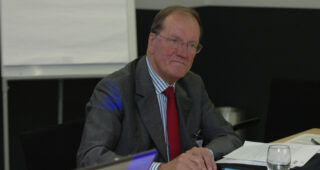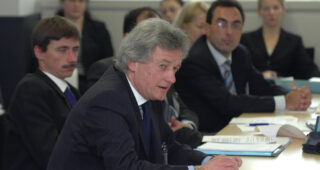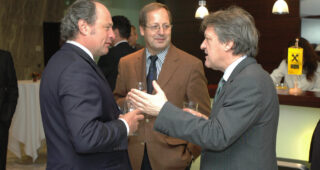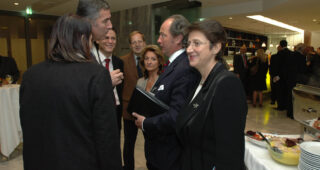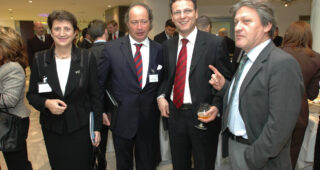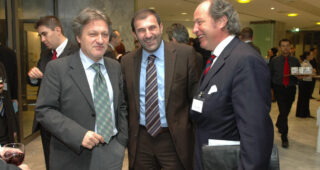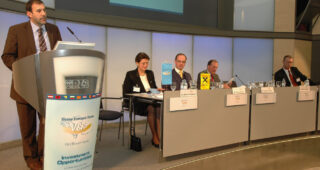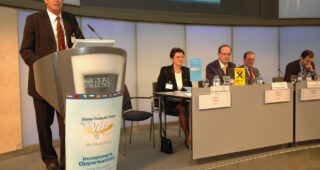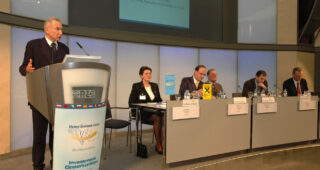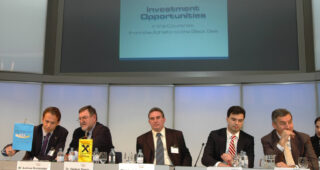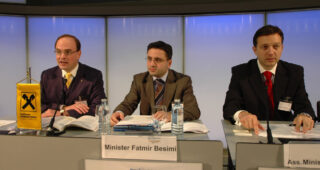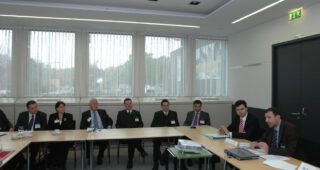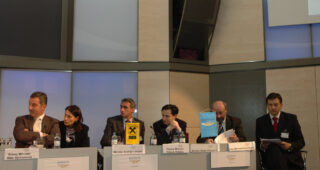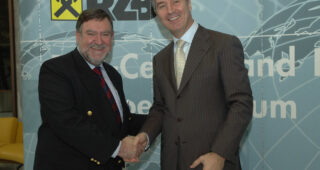Click read more for the summary of the 2nd Vienna Economic Forum which took place on 7th November 2005 in Raiffeisen Zentral Bank, Vienna.
Small and Medium sized Enterprises
Chaired by Dr. Rudolf Gruber (EVN AG).
The discussions in Roundtable 1 were focused on the increasing importance of the Small and Medium sized enterprises in the course of stabilisation of the economies of the region. The panel was moderated by Dr. Rudolf Gruber, President of the advisory board of EVN AG Austria.
The panel were based on the keynote address by Mr. Hanno Soravia describing the experience of one of the investment pioneers within the medium-sized enterprises in the South-Eastern European region.
Under the participants in first panel were H.E. Bojan Dimitrijevic, Minister of Trade and Tourism of Serbia, representatives of the World Bank, Raiffeisen International, as well as representatives of the administrative institutions of Albania, Austria, Bulgaria and Lithuania.
In his opening remarks Dr. Gruber underlined the importance of transfer of know-how between the countries, as well of the importance of the exchange of experience between the investors in the region. He underlined the essence of the intercultural connections on the level of administrations, and also day-to-day business participants. He mentioned that through intercultural connections of the countries in the region and the EU Member States we can speed up the development and conclude reforms in the region within the next 4 to 5 years.
After his opening remarks Dr. Gruber past the floor to Minister Dimitrijevic, who presented to the audience the recent development of the Serbian economy. He expressed the delight of the Government of the Republic of Serbia with the past results and namely the achievement of a GDP growth of 8.16% and export increase of 42% in the last year. He underlined the importance of the privatisation process and the progress of the law reforms for the future economic development of the country.
Regarding the investment opportunities in the SME sector Minister Dimintrijevic drew the attention on the over 400 enterprises listed for privatisation in the fields of industry, machine construction, transport, textile and agriculture. Furthermore he announced the opportunity of purchasing share funds in some private and state enterprises. Minister Dimitrjevic announced the proceeding privatisation of 10 hotels and 600 small enterprises in the tourism sector. Concluding Minister Dimitrijevic encouraged the potential new investors drawing the attention on the positive experience made by the already presenter ones.
SUMMARY OF ROUNDTABLE 2
Cross-border Financing Arrangements and Investment Climate
Chaired by Mag. Peter Lennkh, Member of the Managing Board, Raiffeisen International Bank-Holding AG
The discussions in Roundtable 2 implied the cross-border financing arrangements and the investment climate in the region between the Adriatic and the Black Sea. The panel was chaired by Mag. Peter Lennkh, Member of the Managing Board of Raiffeisen International Bank-holding Austria.
Under the numerous participants were H.E. Fatmir Besimi, Minister of Economy of Macedonia, Mr. David Sopta, Assistant Minister of Foreign Affairs of Croatia, Dr. Artur Gherman, Representative of the Chamber of Commerce and Industry of Moldova and number of representatives of the domestic and foreign banks presented in the region as well country representatives and heads of enterprises interested in the financing opportunities in the region.
The roundtable began with the keynote speeches of Minister Besimi and Assistant Minister Sopta.
Minister Besimi described the recent developments of the Macedonian market. He informed the audience about the constant economic growth of the country in the recent years as well about the positive business climate. The Minister announced the Government’s decision in offering to foreign investor the possibility of acquiring 100% of the shares in public units listed to privatisation. Furthermore foreign investors are allowed to purchase land in order to establish their business activities without further administrative barriers.
Two big privatisation projects in Macedonia were mentioned by the minister: the already completed deal in takeover of the property of the Macedonian telecommunication company by Deutsche Telecom amounting 323 Million Euro and the following scheduled privatisation of the energy market. Although Minister Besimi gave the opinion that the average of the Foreign Direct Investments in Macedonia with 500 USD per Capita is still quite low.
The Minister informed about the further investment opportunities in Macedonia, focusing on the energy, data transmission, tourism and agriculture sectors and specified the government measures and recent business initiatives improving the business climate. Finally minister Besimi appealed for collaboration between the Governments and the business representatives from the countries of the region.
Assistant Minister Sopta presented the recent development of the economy in Croatia. He pointed out the proved stability of the economy in the country over the last 10 years ranging Nr. 2 in CEE. The average GDP growth in the recent years in Croatia amounts 4.3%. Mr Sopta mentioned that Croatia is going through a considerable transformation and the economic structure is moving quickly toward a dynamic and competitive market-based system. Therefore a fully functioning financial system is of pivotal importance for efficient and effective investment.
Unemployment has been still one of the problems in Croatia and a clear obstacle to growth. Reaching a maximum of 17% in 2000, the unemployment rate shows a clear downward trend as a result of implemented reforms and Government programs, and it is now at the level of 13.8%. Although Croatia’s GNI outperforms other EU Candidate and Acceding Countries, the income gap with EU average still exists.
Presenting the financial market in Croatia Assistant Minister Sopta said that the financial system is dominated by banks. Over 80% of financial institutions’ assets are held by banks, followed by insurance companies and investment funds. The stock market in Croatia is relatively well developed, in line with stock markets in Hungary and Slovenia, and its market capitalization reaches over 30% of GDP.
Concluding Assistant Minister Sopta presented the main economic policy goals of the Government of Croatia in medium term according to the start of negotiations for EU full membership. The Government priorities are focused on a sustainable growth and competitiveness, resulting from continued macroeconomic stability and implementation of reforms. The aim is to foster further private sector privatization, while Government investments will be directed in areas related to EU accession. Macroeconomic stability will be achieved through continued fiscal consolidation and stable monetary policy along with achieving external stability by addressing important issues of external and public debt. All of these Government’s measures will significantly improve the investment climate, thus making Croatia a highly attractive place to invest.
Following that Mr. Peter Ivanovic, Director of the Investment Promotion Agency of Montenegro presented the economic development and financial market in the country. He mentioned the introduction of the Euro as official currency and its advantages for foreign investors in Montenegro. As main priority of the country’s policy Mr. Ivanovic defined building up the trust of foreign investors in the securities of their investments in Montenegro. He also underlined the decrease in taxes to 9%.
Regarding the financial market Mr. Ivanovic informed that the most financial institutions in Montenegro have been already taken over by private hands. He focused the attraction of the audience of the proceeding privatisation of the telecommunication sector as one of the most attractive investment opportunities in the market at the moment.
The highlights of the discussions in Roundtable 2 were the strong interest in infrastructure and environmental investments in order to meet the EU standards. However to make it happen the countries need joint ventures and especially the cooperation with EIB, IFC and other international financial institutions. The need of reviewing the procurement laws for all countries has been identified.
In the course of the discussions Mag Lennkh drew the attention of the participants of the financing opportunities offered by Raiffeisen International in the region. The group is presented by 8 banks in the countries between the Adriatic and the Black Sea. Up to now it possesses 10 Billion Euro in assets and engages 10,000 employees. Mag. Lennkh underlined that Raiffeisen international appreciates the strong economic growth in the area as well the political commitment of the governments to bring the whole South-Eastern European region into the European Union. Mr. Lennkh mentioned the pioneer’s role of the banks in the region in bringing entrepreneurs in the countries. Focusing on the expectation of the foreign banks on the region he underlined the increasing importance of the SME businesses and the downturn of margins in the near future.
Finally Mag. Lennkh summarized that all countries in the region have a tremendous economic growth and undergo a change process toward EU membership. There are a lot of initiatives of the countries to facilitate and support international trade and FDI. A clear competition among the countries for FDI is to be noticed. Therefore according to Mag. Lennkh the today’s forum is a good platform to make a constructive competition and maybe to unite the political desires. Summarizing Mag. Lennkh mentioned the great investment opportunities and the best prognoses for the coming years for return on the investments made at this point of time in the region.
SUMMARY OF ROUNDTABLE 3
TELECOMMUNICATION AND INVESTMENT CLIMATE
Chaired by Dr. Boris Nemsic, CEO mobilcom Austria AG
The roundtable about the development in the telecommunication Sector in the Region and the investment opportunities in this branch was chaired by Mr. Dr. Boris Nemsic, CEO of mobilkom Austria. Mobilcom Austria is the leading mobile telecommunication company, founded as an independent legal entity to the State.
Under the large number of participants were H.E. Mr. Lulzim Basha, Minister of Public Works, Transportation and Telecommunication of Albania, H.E. Dr. Shpresa Kureta, Ambassador of the Republic of Albania to the Republic of Austria, significant number of representatives of the Albanian enterprises, Mr. Dipl.Ing. Michael Borze, Managing Director of BENQ Austria and Dr. Peter Goldscheider, Managing Partner of EPIC.
Dr. Nemsic started his opening remarks defining the major investments made recently in the Region and concluding that a big investment movement has been observed. Deutsche Telekom has continued its world expansion acquiring the majority of the Macedonian telecommunication company and has planed a new acquisition in Montenegro. Thereby Deutche Telekom is represented by direct or indirect investments in three of the countries in the region between the Adriatic and the Black Sea – Croatia, Macedonia and Montenegro and in 3 of the New EU-Member States- Slovakia, Czech Republic and Hungary. Mr Nemsic has also announced the recent biggest investment in Bulgaria notified by some 1.6 Million Euro and namely the acquisition of Mobiltel by mobilcom Austria. Furthermore Dr. Nemsic mentioned the take over of 100% of the Romanian telecommunication market by Vodafone.
Dr. Nemsic concluded his opening speech by reminding the founding idea of Vienna Economic Forum and namely that to be a platform where investment opportunities can be defined and speed up.
Than the H.E. Mr. Lulzim Basha, Minister of Public Works, Transportation and Telecommunication of Albania informed the audience about the development of the IT and telecommunication market in Albania. As Albania continues its transition to a market economy, the demand of information technology and telecommunications products is increasing. The market for IT and telecommunications products in Albania has grown 15 to 20 percent annually in recent years. Government procurement projects, including those financed by international financial institutions such as the World Bank and the European Bank for Reconstruction and Development, generated growth in this market. Increased foreign investments, primarily in the mobile telecommunications sector, are also a growth factor. Albania is a market of only 3.3 million people but a lot of companies may wish to consider Albania as a launching point for Southeast European markets.
Albania has zero or low duties on IT and telecommunications imports and does not apply market barriers to prevent the import of such products.
Over the next three years, the top sales prospects for IT and telecommunications in Albania includes microwave links, fiber-optic connections, GSM infrastructure, customer care and billing systems, LAN/WAN solutions, applications software, networking software, electronic design automation, Internet software, e-business management solutions, enterprise planning, Web-design software, and banking software.
The floor was taken over by Dipl.Ing. Michael Borze, Managing Director of BENQ Austria. He mentioned the recent acquisition of 48% of Siemens Telecommunications by BENQ amounting 20 Billion Euro. BENQ is planning increase of production capacity in the telecommunication sector within the next 10 months and a reallocation of the production in Croatia, where already 12 Billion Euro have been invested. Mr. Borze expressed his opinion that right now markets as Bulgaria and Romania are much more attractive for foreign investors as there the labour costs are around 1% of the cost of the product. According to Mr. Borze’s opinion CEE is for sure the market where production will move, because the market of the 10 New EU Member States is overloaded and in the region between the Adriatic and the Black Sea there is in general high skilled and cost-efficient personnel.
In the course of the discussion over the different investment opportunities in the region Dr. Goldschneider gave the opinion that in the South-East European market there is a large number of foreign banks presented as RZB, UNIcredit and branches of HVB Group, who offer good conditions for financing of reasonable investment project in the region. He also mentioned the use of the IAS (International Accounting Standards) as a precondition for the money borrowing in the region.
After a question about the future of the post services in the region and in particular in Albania, the possibilities of lounging wireless technologies were discussed. Minister Basha expressed the opinion that wireless technologies are at the beginning of their establishment in even more developed IT markets as Albania. In this aspect Mr. Borze mentioned that we shouldn’t underestimate the social side of the continually growing and innovating technologies, as in the near future according to Mr. Borze’s opinion people would want to be disturbed all around with information. In response to this believe Dr. Nemsic said that the trend in educating people and transferring of information to the next generation is right now in the IT technologies, so he do not expect a downturn in the development and the use of new and speedy IT solutions.
Dr. Nemsic addressed the standardisation of the IT sector within the European Union and noticed the lack of a standard regulation on the Single market and the existence of 37 different markets in Europe. In respect to this fact Mr. Nemsic asked the opinion of Minister Basha, about the need of united regulation within Europe. In respond Minister Basha appealed not to underestimate the dubious cartel behaviour of some mobile multinationals and that within the European market there has to be protection against the monopoly.
During Roundtable 3 Mr Sani Ljibincic, Director Section Investment Promotion in the Ministry of Economy of Croatia presented shortly the recent developments in the Croatian economy and telecommucation market.
Mr. Ljibuncic presented the law framework and listed the advantages for foreign investors as free transfer of capital and free transfer of profits gain in Croatia to the country of origin of the investment, equal rights for domestic and foreign investors, reviewed company law meeting the EU standards, busting measures and free zones. He showed that FDI quadrupled over the last years due to the signed arrangements with WTO, CEFTA, also due to the elimination of administrative barriers and the introduction of consequent investment incentives trough the law as the reduction of the tax level from an average of 35% to 20%.
In the field of the fixed line network there are 2 network operators on the telecommunication market in Croatia. Since 2004 there have been 14 new market entries trough applied licences. The line network has been already digitalized by 100% with over 15,000 km optic cable network. The market penetration in this line of business amounts 42.5% with around 1.9 Million line network customers and about 130,000 customers in the cable TV network.
On the mobile communication markets in Croatia 3 operators have been registered, the last started business activity in July 2005. The market penetration in this sector amounts 67.2% with round 3 Million customers.
Mr. Ljibuncic concluded his presentation noticing the fourth position of Croatia within the South-Eastern European market in foreign direct investments (inclusive the privatisation of the mobile telecommunication market) last year amounting 2,403 US Dollar per capita.
Summary of Roundtable 4
Infrastructure project and Investment climate
Chaired by Ing. Otto Musilek,
Founding Member of Vienna Economic Forum, Managing Director OMV Gas
The Roundtable was chaired by Ing. Otto Musilek, Founding Member of Vienna Economic Forum, Managing Director OMV Gas. Under the numerous participants were H.E. Dragan Doko, Minister of Economy of Bosnia and Herzegovina, H.E. Valeriu Ostalep, Deputy Foreign Minister of Moldova H.E. Juliu Winkler, Delegate Minister of Commerce of Romania, H.E. Andrea Lompar, Minister of Transport of Montenegro.
During the Roundtable H.E. Dragan Doko, Minister of Economy of Bosnia and Herzegovina underlined that the Government of Bosnia and Herzegovina is working on developing a sustainable market economy and fulfilling all conditions to start EU integration process. As a result of serious and difficult reforms during the last 2 years now Bosnia and Herzegovina is expecting new round of negotiation with EU to start until the end of 2005. To continue the reform process the Government needs to set up legal, economical and social trials. Minister Doko emphasized on the importance of further development in the private sector, public finance and privatization process. He pointed out the positive effect of regional cooperation with other South-Eastern countries and the international support for the implementation of economic reforms in Bosnia and Herzegovina. As an example, foreign direct investment has been increasing, especially in the production and banking sector.
H.E. Valeriu Ostalep, Deputy Foreign Minister of Moldova, informed the audience about the investment climate in his country. The Moldova – EU relations are the major objective of national and foreign policy. The country is in process of fulfillment of the EU conditions. Attraction of foreign investments is priority. Currently Bilateral Agreements have been signed with 35 countries, including SEE, and Commonwealth countries. Energy sector is a priority for the Government, and there is strategic interest in joining the Energy Treaty for Southeastern Europe (SEE), which Moldova is joining as observer. Diversification of energy supply sources is of great importance. Problems are faced in obtaining access to the pipeline network of energy delivery, which makes regional cooperation a priority in this field. Moldova has been operating a project for building a new pipeline to Romania. In the area of transport infrastructure priorities are the development of a modern and efficient transport system network and integration of the network roads and railroads into the European system. Moldova tries to promote some of these projects using the Stability pact.
H.E. Juliu Winkler, Delegate Minister of Commerce of Romania was the next one to have a presentation. He said that the first Summer Edition of VEF was held in June 2005 in Bucharest and it was an honor and pleasure for the Romanian Government to host this session. He said Romania is a big and important participant on the SEE scene and it may also be considered a determent junction between Europe, Asia and the Middle East through its infrastructure of road, railway, Corridor 7 and the Black sea. Romania has a new Government since January 2005 and it continues the efforts on improving the business climate. Further decreasing of inflation rate, reducing taxes, stimulating private policy and reducing hidden economy are among the tasks of the Government. A major objective of Romania is EU integration, joining on 1 January 2007. Country report has been positive from the European Commission. Further efforts are necessary regarding the fight against corruption, judiciary system and minorities. Major investments and privatizations in Romania include Renault, RZB, OMV, Ote telecommunication. A main target is investment in infrastructure development, supported by EU – Nabucco project, Constanza-Trieste pipeline, Corridor 4, 7 and 9. There is also a highway project in north Transylvania, not supported by the EU. H.E. Winkler was glad to report the first common meeting of 2 Governments in the region on 20 January 2005. On this joint cabinets meeting 15 projects have been approved and signed by the two Governments of Romania and Hungary.
H.E. Andrea Lompar, Minister of Transport of Montenegro described shortly the economical and political situation in his country. Political stabilization is achieved, privatization is progressing, and living standard of the population is increasing. Foreign investors are interested in Montenegro, specifically in the areas of tourism and transport. Investment opportunities in the transport sector include privatization, reconstruction, modernization and building of new rail, also ports, airports, roads. The integration in EU is a main issue, also in terms of transport integration. H.E. Lompar presented a project for a Trans-European corridor passing through Montenegro. This is the Adriatic-Ionian transport corridor, carried out by Montenegro and 4 countries from the region. This highway includes 7 countries and will support the integration of Montenegro and the development of the region. The project does not get enough support from Brussels at this point, but H. E. Lompar hopes that it will be realized.
Ing. Otto Musilek, Director of OMV Gas and Founding Member of Vienna Economic Forum presented the importance of OMV Gas in Central and Eastern Europe. With the acquisition of 51% of Petron (Romania) OMV has become a leading integrated oil and gas group in Central and Eastern Europe. Ing. Musilek mentioned the key success factors for investment in SEE – strong investment climate, establishment of a common European framework, stable investment conditions, clear definition of interest rate level, security about negotiation principles and Intergovernmental Agreement. He also mentioned the importance of modernizing the existing infrastructure.
Mr. Johann Gallistl from OMV Gas presented the Nabucco project. This pipeline project connects Eastern Turkey, Bulgaria, Romania, Hungary and Austria. The participants are OMV (Aus), MOL (Hun), Transgas (Rom), Bulgargas (Bul), BOTAS (Turkey). The feasibility study phase of the project has been completed and the route is fixed. The project is now facing the development phase, which is supposed to finish 2007 and construction is to follow in 2008. The gas sources are the Caspian region (Azerbejgan), and the Middle East (Iran, Egypt and optionally Iraq). The outcome of the market study shows 50% for the SEE market and 50% for the EU market. There is a Nabucco gas pipeline international company (residing in Vienna) and local Nabucco companies are to be established in the participating countries.
Mrs. Slavica Korica from Investment Promotion Agency of Bosnia and Herzegovina presented the investment environment in her country. Financial stability has been achieved in Bosnia and Herzegovina, with lowest inflation rate in the region, being in the past 4 years under 1%. There is large inflow of foreign banks, which posses 64% of the capital in the banking sector there. Bosnia and Herzegovina has preferential export regimes with EU countries, as well as with USA, Australia, New Zealand, Russia, Japan, Canada, Switzerland, and Norway. Bosnia and Herzegovina were the first to sign Free Trade Agreement with all countries in the Balkan region, and with Turkey. One of the most important ways to invest in Bosnia and Herzegovina is privatization, about 2/3 of investments have been done through this process. Privatization of big state monopolies (telecom companies) is expected. Mrs. Koriza mentioned the major infrastructure project in the country – Corridor 5C motorway, connecting Budapest with the Adriatic Sea. Further infrastructure projects planned include the railway on the same corridor, two major ports on the river Sava, and expanding the natural gas network.
Mag. Michaela Götz, Manager of International Relations – Central Europe, Austrian Airlines, held the final presentation. AUA are good contributors in bringing foreign investments in SEE, serving 41 destinations in the regions. Mrs. Götz explained the process of liberalization in the aviation areas and agreements. The European common aviation area includes EU, Iceland, Norway and Switzerland. This area is going to expand with Bulgaria and Romania when they join EU. There are also talks with the countries from the Western Balkan region. The integration of new members of the European Common Aviation Area will follow gradually in three phases beginning with ratification of the multilateral agreement by 2007, followed by transitional period and ending with the full integration. The effects of liberalization will be a market consolidation, free competition, lowering prices. National economics will benefit through better accessibility, which may enhance economic growth, and increase in tourism.
